Consumers call the shots now and we better get used to it – IBC 2017
The internet is a wonderful thing for most people, with its cat videos and platform for exhibitionism, but there has been a cost to those who used to control the flow of content.
September 14, 2017

The internet is a wonderful thing for most people, with its cat videos and platform for exhibitionism, but there has been a cost to those who used to control the flow of content.
The first casualty were the newspapers. The internet democratised information meaning you didn’t have to buy the morning rag. It diluted the advertising business model and has dampened the influence of many former moguls. But traditional TV has also been on the back foot. This might have been a bit more of a slow decline, but the slope is getting steeper.
Speaking at IBC 2017, Kim Proder of Modern Times Group (MTG), one of the Nordic’s largest broadcasting and content companies, highlighted where the pain is. It’s in the subscription models. The VOD services. The advertising revenues. The content production relationships. It is everywhere.
The theme for this years conference is ‘truth, trust and tranformation’, but lets be honest about what this really means; ‘cord cutter, cannibalization and cost savings’.
The millennials are the cause. Us again (speak for yourself – Ed). Generation X can’t seem to find any other reason for things going wrong. But it is true. Millennials are shifting the video and content market to anywhere and everywhere. They don’t want to sit down in front of the TV at 7.30 to get a daily update, they want to do it when they want. And this doesn’t just mean the time and place, it means the channels as well. Facebook and YouTube are becoming the new go-to places for content.
For Proder, this is a new paradigm which needs to be accepted. The value chain of the broadcasting world has changed forever. Companies like MTG no-longer dictate the agenda, the consumer has the power. Many might be preparing for this change, but that is too late; the power shift has already happened.
“I grew up in a home where we had one phone, and one television screen,” said Proder. “It was small and probably black and white. But when I look at my home now, I can count probably ten screens. This has changed the value chain, the power is now in the hands of the consumer.”
But this is not necessarily bad news. Video is growing and growing fast. There is an appetite for content, and consumers are greedy. The question is how to adapt to this change.
For MTG, the change started in 2015. The team made the conscious decision to focus more on digital. Now, many have made this decision, but few have followed it up with any gusto. MTG on the other hand sold traditional TV businesses in Africa, the Czech Republic and the Baltics, and invested heavily in the new world. It bought eSports brand ESL, gaming brands InnoGames and Kongregate, and also digital video platforms Splay Networks and Engage. Out with the old, and in with the new.
But this is the only fundamental change. MTG can no-longer control the consumption of the content, it just has to be present in same place as the consumer. This means Facebook or YouTube or any other platform which you can imagine. As long as you are meeting the consumer and offering a relevant product, you are doing your job.
Think about the core business of MTG; cultivate and audience, and then whore that audience out to the highest bidder. This concept has not changed, only the delivery. The advertising relationship are still the same; the metrics might be different, but the concept of capturing an audience and putting a relatable marketing message alongside still works.
But the key here is sacrifice. As Proder put it: “You can’t protect what you have. You have to invest in new areas and be prepared to cannibalize yourself”.
Video is for the brave.
Facebook stole your sandwich, but wants to sell you a salad
Alongside Proder, Facebook’s Daniel Danker also gave his vision for video, and it focused around two areas; Facebook Live and Facebook Watch.
Facebook’s video ambitions are no secret. It views video as the next champion as traditional online advertising begins to slow. In Live and Watch, Facebook has two platforms which are highly engaging, highly interactive and potential highly profitable.
Danker claims these products can help create and engage an audience. Facebook Watch certainly looks to be a good platform for distribution, and Facebook Live receives 10X more comments than other videos. Another interesting statistic from Facebook is the way videos are viewed. 40% of videos are viewed by someone sharing it (either on their feed or by tagging a specific person). The snowball effect of reaching new audiences is potentially massive.
But here’s the PR spin. Facebook is selling you a solution, to a problem it created. Admittedly, blaming Facebook alone would be cruel, but the OTTs are the cause of the challenges being faced by traditional media. They are the ones who offered flexibility and changed the rules of the game.
This is something the traditional broadcasters might have to accept. They will never be as profitable and powerful as they once were. For being the distribution platform, Facebook will take a cut of revenues. The broadcasters will still have control of the (although not all) advertising relationships, but they have lost the distribution channels. And they will probably never have control of them again.
When most industries are disrupted, the disruptor takes control of the relationship with the end-user. But this is a strange one, as Facebook is leaving the relationship with the end-user alone when it comes to content. It wants to be a curator, not a producer. You can have a relationship with the consumer, but you have to pay us for the privilege of accessing them.
As Danker put it: “We want to be a platform where people can find shows and content which they love. But we also want to be a platform where content creators can engage with their audience.”
It is an evil, brilliant move. Facebook is not stealing advertisers or revenues directly from the broadcasters, but telling them they have to pay to continue their way of life. It is holding the audience to ransom.
So we stole your sandwich, but you can have it back as long as you buy a salad off us.
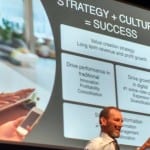
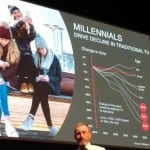


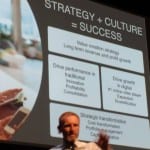
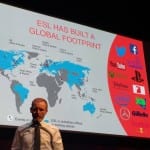
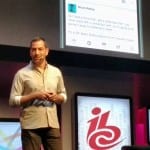
About the Author
You May Also Like


.png?width=300&auto=webp&quality=80&disable=upscale)







.png?width=300&auto=webp&quality=80&disable=upscale)


_1.jpg?width=300&auto=webp&quality=80&disable=upscale)